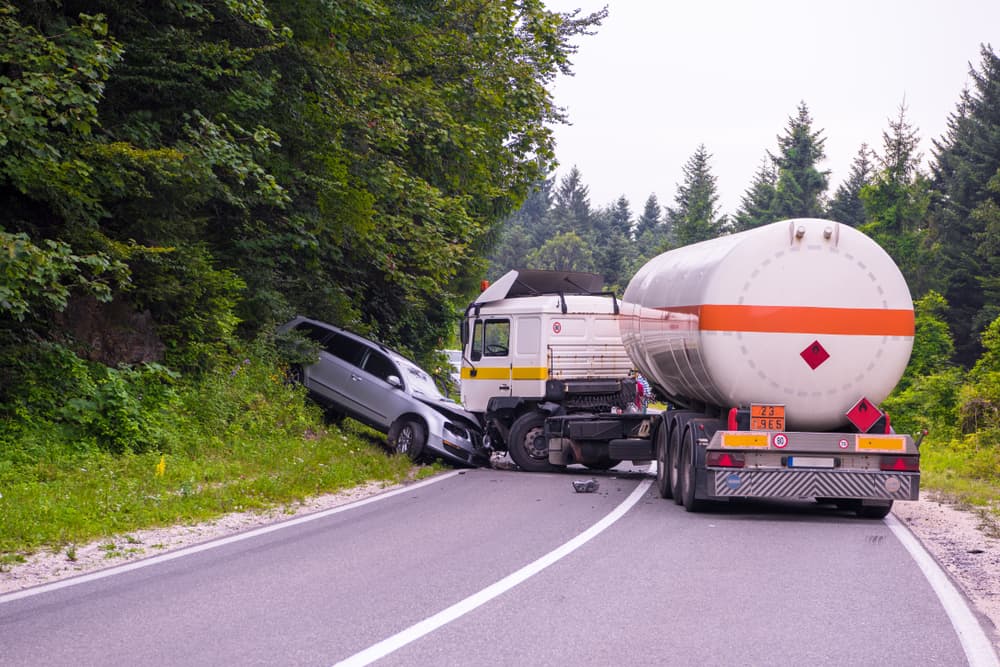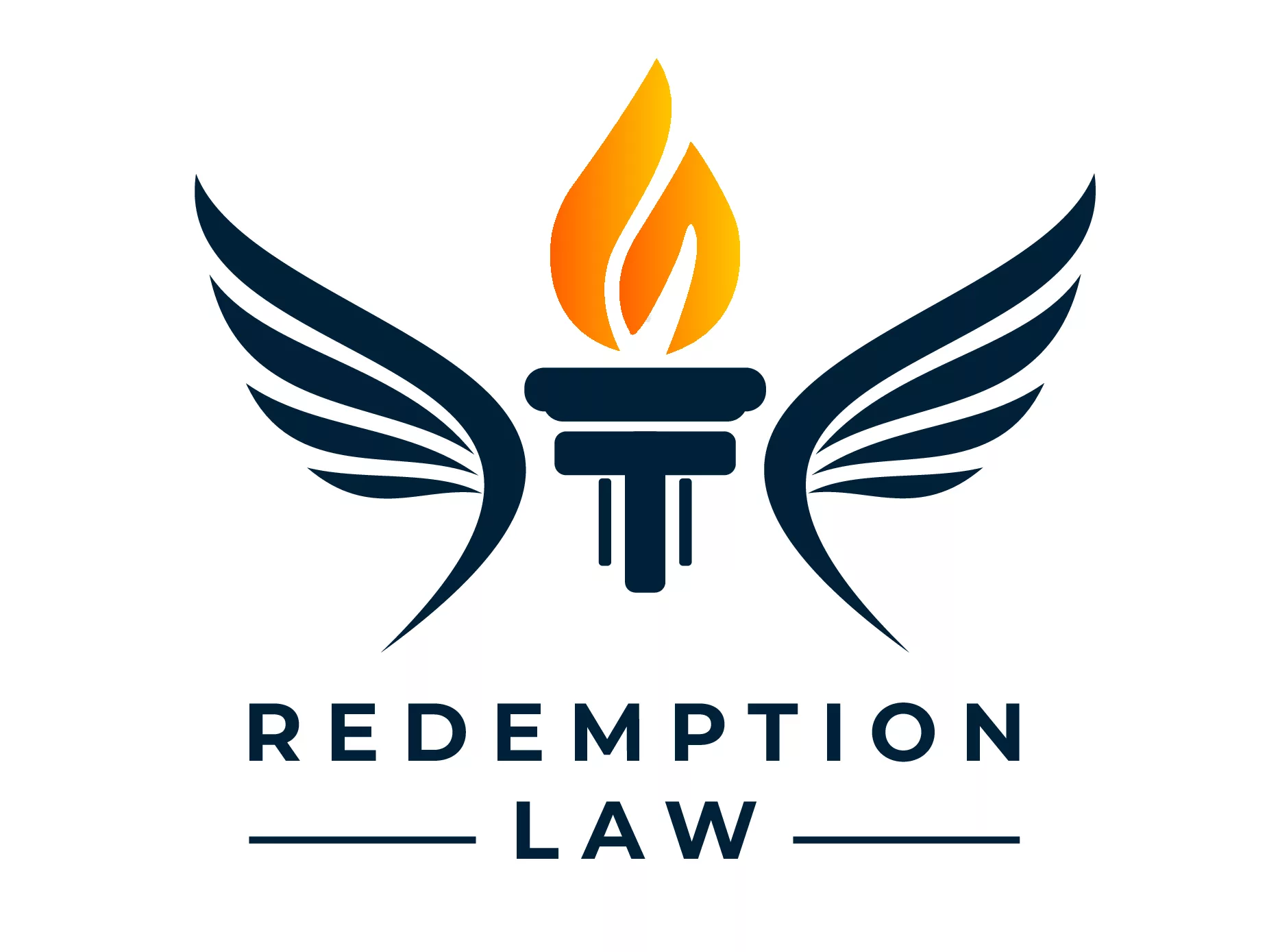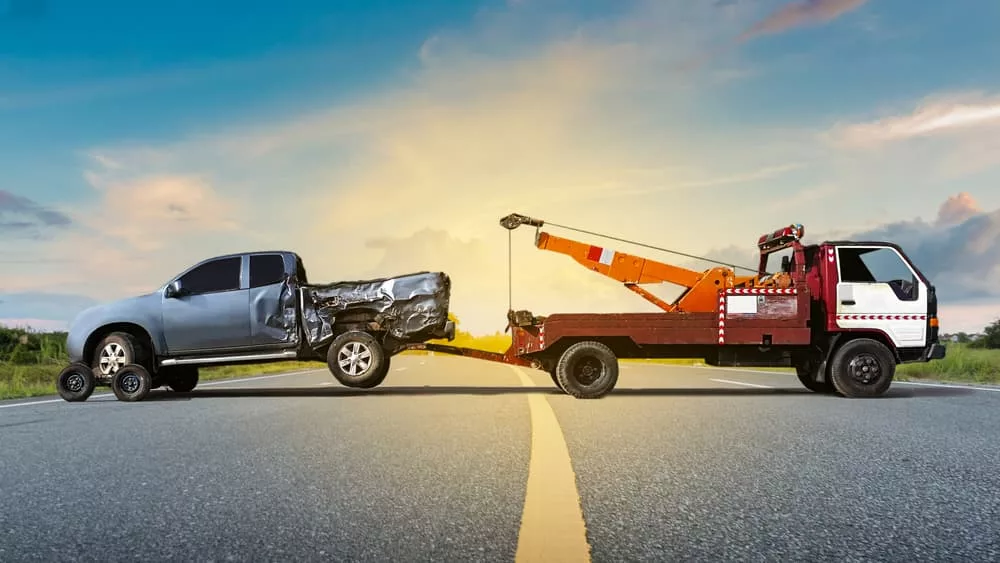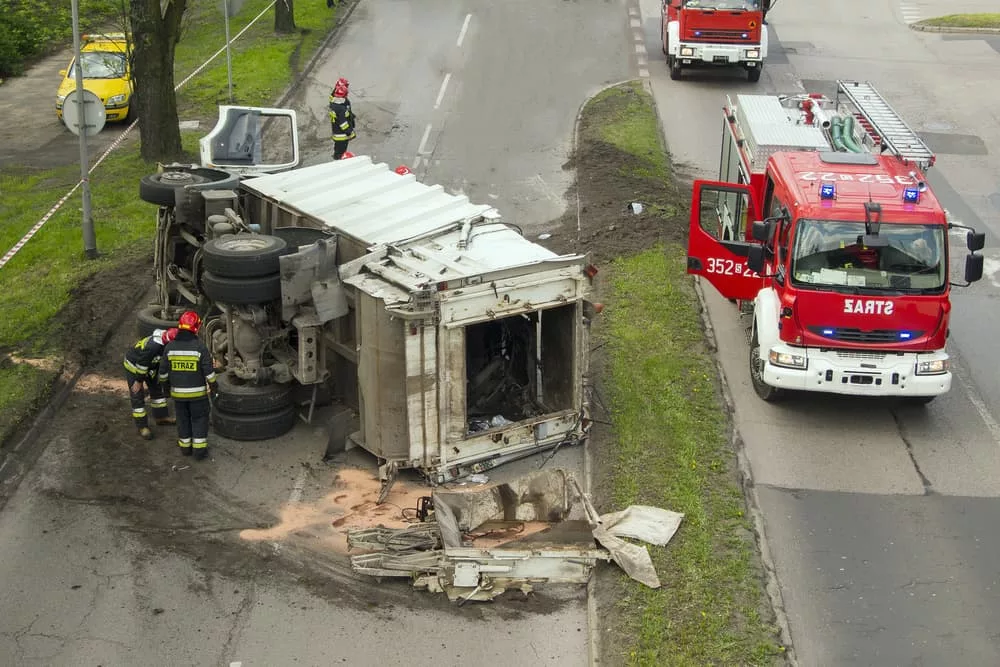Truck accidents are a major concern on our roads due to their potential to cause severe damage, catastrophic injuries, and even fatalities.
The different types of truck accidents each have unique contributing factors and consequences. This article will delve into the various types of truck accidents, outline the primary causes behind each, and discuss their implications for those involved. This knowledge can improve driver safety and help determine liability and legal options after such accidents.
Get the support you need after a truck accident. A skilled truck accident lawyer can navigate complexities, gather evidence, and fight for your rights.
Common Causes of Truck Accidents
Though there are almost infinite reasons and fine details that could have caused a truck accident, some common factors start the chain of events. These common causes include:

Driver Error
One of the leading causes of truck accidents is driver error, which encompasses a range of behaviors and circumstances, including:
- Fatigue: Due to long hours and tight deadlines, truck drivers often experience fatigue, which can significantly impair their ability to operate the vehicle safely and react to potential hazards.
- Distraction: Various distractions can divert a driver’s attention from the road, including texting, eating, or adjusting the radio. Such distractions may lead to a delayed reaction time or loss of vehicle control.
- Impairment: Driving under the influence of alcohol or drugs impairs a driver’s judgment, coordination, and reaction time, making it more likely for an accident to occur.
- Speeding: Exceeding the speed limit or driving too fast for road conditions reduces the driver’s ability to react to sudden changes in traffic flow, increasing the chances of a crash.
Mechanical Failure
Truck accidents also result from mechanical failures, such as:
- Brake failure: Worn or defective brakes may hinder a driver’s capacity to stop the truck, leading to devastating consequences.
- Tire blowouts: Overinflated or worn-out tires could blow out, causing the driver to lose control of the vehicle or initiate a dangerous chain of events.
- Steering system failure: Malfunctions in the truck’s steering system make it difficult or impossible for the driver to navigate safely, raising the risk of an accident.
Improper Loading
Cargo issues, such as overloading or unsecured cargo, also contribute to truck accidents.
These may include:
- Overloading: Excessive weight may cause instability, leading to a rollover or difficulty controlling the vehicle.
- Unsecured cargo: Improperly stored or unsecured cargo might shift during transport, causing the truck to lose balance or even resulting in debris falling onto the road, creating hazardous conditions for other motorists.
Poor Maintenance
Neglecting truck maintenance can lead to accidents.
This could include:
- Lack of regular inspections: Failing to perform routine inspections can result in unaddressed safety issues, causing malfunctions or failures on the road.
- Failure to address known issues: Ignoring identified problems may escalate into dangerous situations, leading to accidents and potential liability.
Identifying the Parties Involved in Truck Accidents
Determining liability in truck accidents is often complex due to the multiple parties involved. Here are some of the key players that may bear responsibility in a truck accident:
Truck Driver
A driver could be liable if their actions or negligence led to the accident. Examples include speeding, driving under the influence, or disregarding safety regulations.
Trucking Company
The company that employs the driver or owns the truck may be responsible for various reasons, such as negligent hiring, inadequate supervision, unrealistic scheduling, or failure to enforce safety regulations.
Cargo Loader
Improper cargo loading, whether overload or inadequate securement, can lead to accidents. In this case, the party responsible for loading the truck may be liable for any damages.
Maintenance Provider
If poor maintenance contributed to the accident, you could hold the company servicing the truck accountable. This could include failing to perform regular inspections or not addressing known issues.
Understanding the roles and potential liability of each party involved in a truck accident is crucial when pursuing a personal injury claim. In the following sections, we’ll discuss the regulations governing the trucking industry, evidence collection, and the legal process of seeking compensation for injuries and damages sustained in a truck accident.
Federal and State Trucking Regulations
Federal and state bodies govern the trucking industry to promote safety and prevent truck accidents. Some key regulations include:
Hours of Service Rules
These rules limit the hours a truck driver can be on duty and behind the wheel. This aims to reduce fatigue-related accidents by ensuring drivers get adequate rest.
Weight Limits
Regulations exist to limit the total weight of a truck, including its cargo. Overloaded trucks are more difficult to control and take longer to stop, increasing the likelihood of accidents.
Maintenance Requirements
Federal and state laws mandate regular maintenance and truck inspections to identify and repair potential safety issues. Compliance with these rules ensures that trucks are in proper working condition and reduce the risk of accidents due to mechanical failure.
Licensing and Training Requirements
Truck drivers must hold a valid commercial driver’s license and meet certain training requirements before legally operating a commercial vehicle. These requirements ensure that drivers have the necessary skills and knowledge to navigate the roads safely.
In the event of a truck accident, a personal injury attorney can determine if any violations of these regulations contributed to the crash.
Evidence Collection and Preservation
In a truck accident case, your lawyer must gather and preserve evidence to establish liability and build a strong personal injury claim, including:
Photographs of the Accident Scene
Photos capture critical information about the accident, such as the truck’s position, vehicle damage, and road conditions. Hiring a professional photographer or using a high-quality camera can create more compelling images.
Witness Statements
Eyewitnesses often provide valuable details about the events leading up to the accident and during and after the collision. An attorney can identify and interview witnesses and obtain their written statements.
Police Reports
These official records often contain essential information about the accident, including the investigating officer’s findings and opinions. Your attorney can request a copy of the police report for your case.
Video Footage
Surveillance cameras from nearby businesses or traffic cameras may have captured the accident. Personal injury lawyers can locate and secure video footage crucial in establishing liability.
Black Box Data, Driver Logs, and Maintenance Records
Modern trucks often have electronic data recorders, sometimes referred to as black boxes, that record information about the truck’s operations, such as speed, braking, and hours of service. Drivers must also log their driving time and maintenance records for each truck. An attorney may obtain and analyze this data to determine whether rule violations or maintenance issues played a role in the accident.
Injuries and Recoverable Damages
Truck accidents can result in severe or even fatal injuries and substantial property damage. Victims of truck accidents may get compensation for injuries and damages, including:
Medical Expenses
This includes the cost of medical treatment, surgeries, therapies, and medications necessary to treat the injuries sustained in the truck accident. Compensation for medical expenses may also cover future medical care if required.
Lost Income
Victims who cannot work due to injuries may get compensation for lost income. Compensation for future lost earning capacity may be available if the injuries result in long-term or permanent disability.
Property Damage
The costs to repair or replace a vehicle damaged in a truck accident can be significant. You may seek compensation to cover these expenses.
Non-Economic Damages—Pain and Suffering
These damages intend to compensate victims for the physical pain and emotional distress they have endured due to the truck accident. Unlike medical bills and lost income, non-economic damages can be difficult to quantify.
A skilled attorney determines an appropriate value for pain and suffering based on the specific circumstances of your accident, injuries, and recovery.
Time Limits for Filing a Personal Injury Claim
The statute of limitations is the time limit for a victim to file a personal injury claim after a truck accident. This time frame varies by state and the type of filed claim. It’s crucial to be aware of these deadlines, as failing to file a lawsuit within the specified time frame may result in losing the right to pursue compensation for the injuries sustained in the truck accident.
If the statute of limitations has expired and a victim attempts to file a lawsuit, the defendant can request the court to dismiss the case based on the missed deadline.
In most cases, the court will grant this request, leaving the victim without legal recourse for their injuries and damages. It’s essential to work with an experienced personal injury attorney who can review the specific circumstances of your case and ensure the timely execution of necessary legal actions to avoid such an outcome.
Determining Potential Sources of Compensation
Navigating the various insurance policies and potential sources of compensation in a truck accident case can be complex. Your personal injury attorney will make sense of these policies and maximize your chances of obtaining fair compensation for your injuries and damages. Potential sources of compensation include:
Truck Driver’s Insurance
In most states, truck drivers must carry minimum liability insurance to cover any damages or injuries they may cause in an accident. Your attorney can identify the truck driver’s insurance policy and assess the coverage limits to determine if can cover your losses.
Trucking Company’s Insurance
Trucking companies must also carry insurance to cover any accidents due to their negligence. In some cases, the trucking company’s insurance coverage is more extensive than the driver’s. Your attorney will investigate the trucking company’s insurance policy and explore the possibility of holding them liable for your injuries and damages.
Victim’s Insurance Coverage
You may seek compensation for your injuries and damages from your insurance provider. This may help if the at-fault parties in the truck accident do not have adequate insurance coverage. Your attorney can review your policy to determine if your insurer will compensate you.
Complex Negotiations With Multiple Parties and Insurance Companies
Obtaining fair compensation for your injuries and damages in a truck accident case may involve negotiations with multiple parties, including the truck driver, the trucking company, their respective insurance providers, and your insurance company.
Each party’s own interests and legal strategies will make these negotiations complex and time-consuming. Your personal injury attorney will represent you in these negotiations, advocating and working to secure a fair settlement for you.
Proceeding to Trial
In some cases, reaching a fair settlement through negotiation alone may not be possible. In this case, your attorney can proceed to file a lawsuit and represent you in court.
During litigation, your attorney will present evidence and arguments to support your claim, cross-examine witnesses, and challenge the opposition’s assertions. By advocating for you both in and out of court, your attorney can protect your rights and ensure you receive fair compensation for your injuries and damages.
The Importance of Legal Representation

The legal process of pursuing compensation for a truck accident is often complex and challenging, particularly for those unfamiliar with personal injury law’s intricacies. Attempting to navigate this process without an experienced attorney may result in a less favorable outcome for your case.
An experienced personal injury lawyer will provide invaluable guidance at every stage of the legal process, from investigating the accident and identifying liable parties to negotiating with insurance companies and presenting your case in court if necessary.
If you or a loved one has been in a truck accident, contact an experienced truck accident lawyer to ensure you receive the compensation you deserve for your injuries and damages. Their experience handling truck accident cases helps you navigate the complex legal process and achieve justice for your suffering.




